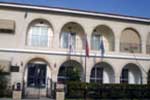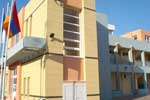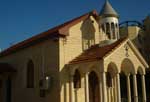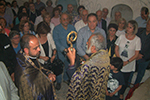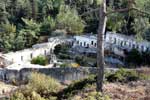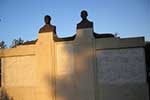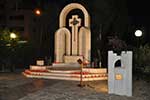Η Στήλη του Σασσουνιαν

TALKS WITH AZERIS TURKS FALTER ARMENIA EXPANDS ACCESS TO GEORGIAIRAN
The budding relationship between Armenia and Turkey, which started with last month's "football diplomacy" with much fanfare and high expectations, is facing serious difficulties.
While no one expected a quick resolution of the long-standing issues stemming from the Genocide and its persistent denial by Turkey, few anticipated that the nascent rapprochement would falter so quickly.
After a very friendly and hopeful first meeting between the presidents and foreign ministers of Armenia and Turkey, occasioned by the unprecedented soccer match between their national teams on September 6 in Yerevan, it appears that the Artsakh (Karabagh) conflict is the main reason for the sudden rift.
To begin with, it was strange that the presidents of Armenia and Turkey did not hold a follow-up meeting during their attendance of the U.N. General Assembly sessions in New York in late September. When Pres. Gul was asked by Turkish journalists why no meeting was scheduled with the Armenian President, he first said he was not aware that Pres. Sargsyan was coming to New York and then assured them that they would run into each other during one of many diplomatic receptions. Despite such optimistic talk, the two presidents never meet. They may have been waiting for the outcome of discussions between the foreign ministers of Armenia, Azerbaijan and Turkey who met on the last day of their stay in New York.
On September 28, two days after Pres. Sargsyan left New York, he told reporters that there were "no concrete results yet" from the foreign ministers' meeting and that he had not expected much from their encounter.
On the same day, Pres. Gul confirmed that there had not been any significant movement to merit the lifting of the blockade of Armenia. Taking a tough stand, he told a Turkish group that no talks on border opening are possible before Armenia's liberation of Azerbaijani territories, according to the AzeriTaj news agency. Thus, Pres. Gul was reverting to Turkey's previous preconditions that had been long rejected by the Armenian side. A senior aide to Azerbaijan's president, in his turn, confirmed this week that several serious issues remain unresolved on the Artsakh issue.
Ankara and Baku assumed that since the Georgian-Russian conflict had temporarily deprived Armenia of the opportunity to import more than 70% of its vital supplies from Georgia's Black Sea ports, this was the ideal time to force Yerevan into making serious concessions on the Genocide issue and the Artsakh conflict.
Whether it was coincidence or not, several major initiatives announced by Pres. Sargsyan last week had the effect of countering the hard-line taken by Ankara and Baku in their recent negotiations with Armenia, and dispelling the false impression that Yerevan is desperately seeking to reopen the border with Turkey at any cost.
Pres. Sargsyan announced during his last week's visit to Tbilisi that he had reached an agreement with Pres. Saakashvili to jointly build a modern highway that would considerably shorten the transport time between the Georgian Port of Batumi and Yerevan.
In a nationally televised speech delivered for the first time in the Armenian Parliament -- akin to the State of the Union address by American presidents before the U.S. Congress -- Pres. Sargsyan announced that a new railway would be constructed to link Iran with Armenia, to facilitate and expand trade between the two countries. He also said that Armenia would build a new nuclear power plant to ensure that the country remains energy self-sufficient when its aging plant is shut down. Finally, he stated that a Pan-Armenian Bank and an investment fund would be established in Yerevan to finance these projects. He said that these "large and daring initiatives" would solve Armenia's important strategic and economic problems.
Along with these major programs, Armenia just formed a new Diaspora Ministry to streamline and strengthen its relations with millions of Armenians living abroad. On September 24, during a major banquet in New York, Pres. Sargsyan gave the 700 Armenian guests an uplifting message of unity, urging them to join forces for the betterment of Armenia and the Diaspora. He also thanked all those assisting in the resolution of the Artsakh conflict, "the condemnation of the Armenian Genocide, and the restoration of historical justice."
These new initiatives are bound to improve Armenia's bargaining hand and help negotiate with Turkey and Azerbaijan from a position of strength. The expansion of Armenia's alternate land routes through Georgia and Iran would considerably diminish the utility of opening the border with Turkey and circumvent more effectively the blockades imposed by Ankara and Baku.
While Armenian officials do want to improve relations with all of their neighbors, they are not so desperate as to make unacceptable concessions on the Genocide and Artsakh issues.
By Harut Sassounian
Publisher, The California Courier






